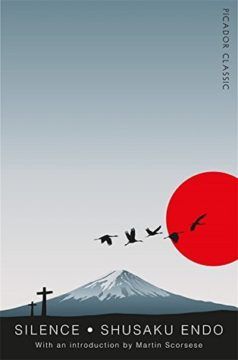Christian Gibbons in Taxis:
 In the 17th century, two Portuguese priests named Sebastião Rodrigues and Francisco Garrpe are faced with a devastating moral dilemma. For the past few weeks, they have been living among a village of Japanese peasants, not far from Nagasaki. The peasants are secretly Christians, and Christianity has been outlawed in Japan. Now an informer in the village has gotten the ear of the state, and the state has demanded hostages. The daimyo (a local feudal lord) will continue to take, cross-examine, and imprison villagers unless someone confesses to either practicing Christianity or hiding the priests. Two of the village’s most revered leaders, Mokichi and Ichizo, volunteer themselves as the first hostages, but don’t know what they should do when put before the authorities. What if they are told to apostatize, they ask, by trampling upon a fumi-e, a stone image of Jesus Christ? Rodrigues, his heart swelling with pity, shouts: “Trample! Trample!” He is immediately reproached by his companion Garrpe, but the essential conflict remains. How can these two priests stand firm in their faith when doing so endangers the very Christian souls that they purport to serve?
In the 17th century, two Portuguese priests named Sebastião Rodrigues and Francisco Garrpe are faced with a devastating moral dilemma. For the past few weeks, they have been living among a village of Japanese peasants, not far from Nagasaki. The peasants are secretly Christians, and Christianity has been outlawed in Japan. Now an informer in the village has gotten the ear of the state, and the state has demanded hostages. The daimyo (a local feudal lord) will continue to take, cross-examine, and imprison villagers unless someone confesses to either practicing Christianity or hiding the priests. Two of the village’s most revered leaders, Mokichi and Ichizo, volunteer themselves as the first hostages, but don’t know what they should do when put before the authorities. What if they are told to apostatize, they ask, by trampling upon a fumi-e, a stone image of Jesus Christ? Rodrigues, his heart swelling with pity, shouts: “Trample! Trample!” He is immediately reproached by his companion Garrpe, but the essential conflict remains. How can these two priests stand firm in their faith when doing so endangers the very Christian souls that they purport to serve?
Both men must travel a long, arduous road before either can find an answer. Shūsaku Endō’s 1966 novel Silence portrays their journey. In the process, it also depicts some of Christianity’s long and difficult history in Japan.
More here.
